- Home
- Richard Lee Byers
Queen of the Depths Page 4
Queen of the Depths Read online
Page 4
“No. You won’t. I’m leaving.” He swam toward the arch, and she centered herself in the space to bar his way.
Hoping it would persuade her to stand aside, he pulled the cutlass from its scabbard. At the moment, she had no weapon but her spells. Of course, those were formidable enough.
She sneered. “Do you truly believe a blade Umberlee put in your hand will cut a waveservant?”
“I think it might,” he said, though her apparent faith in her own invulnerability, crazy as it appeared, was almost enough to make him wonder.
“Think on this, then. Even if you could kill me, what would happen then?”
“Myth Nantar is supposedly full of sea-elves, mermen, and by your own account shalarins who don’t care a snake’s toenail about Umberlee anymore. Maybe I can talk one of them into helping me back to dry land.”
“After you’ve killed one of their own? How would your folk treat a stranger who’d done the same? Even if somebody did decide to help you, do you really believe it would do any good? You, the slayer of Umberlee’s servant, would still be at the bottom of the sea, where all creatures live only at her sufferance. Rest assured she would avenge me before you could escape.”
He hesitated. If it was a bluff, she was selling it well.
Maybe the sensible course was to play along at least until he was back on land. It was possible that with her powers, Tu’ala’keth could even help him locate the cult’s lair. Tymora knew, he hadn’t had any luck on his own.
He let his shoulders slump as if in resignation. “All right. You win. I’m at your—and your goddess’s—service.”
For now. But, Lady, you will never see your goal.
CHAPTER 3
When they reached the shallows, Tu’ala’keth stroked the neck of her seahorse, and the animal obediently came to a halt. Anton stopped more awkwardly, nearly slipping from the back of his steed, and the creature tossed its ruddy, black-eyed head in annoyance.
The riders dismounted, Tu’ala’keth waved her hand in dismissal, and the seahorses swam away to roam and forage as they would so long as they didn’t stray too far from the island. She wanted them to hear and come if she called.
That accomplished, she and the human swam up the slope of the seabed. They soon reached a point where a person could set his feet down and wade with the upper part of his body out of the water, and Anton chose to do so.
She compelled herself to do likewise, meanwhile striving to conceal her trepidation. Such an emotion was weak and unworthy. She had come on Umberlee’s business, and the goddess would protect her.
Still it was one thing to be certain of her deity’s power and another to place her confidence in the contrivances of the Arcane Caste. If the talismans they’d provided failed to work properly, she was in for discomfort, even pain.
When she raised her upper body out of water the sun was even brighter, but with her goggles in place, she could see. The air passing through her gill slits felt strange, thin, but sustained her nonetheless. The latter benefit was due to the enchantment woven into her silverweave armor, a fine mesh tunic of worked coral.
Anton made a retching sound and, as she turned to look, finished coughing the water from his lungs. He straightened up, wiped his mouth and shaggy black whiskers, and asked, “Are you doing all right?”
“Of course.” She hefted her stone trident. “Onward.”
They sloshed toward the white-sand beach. Tu’ala’keth had done a bit of walking in her life, but not much, and it made her feel as clumsy as Anton had looked trying to manage the seahorse. She resolved to master the trick of it as quickly as possible.
She supposed she might have quite a bit to learn, for the landscape before her looked dauntingly un-familiar. In its essence, Dragon Isle—a name of good omen, surely—was a mountain like any other, just one so tall its crest rose high above the surface of the sea. But it had no abundance of fish swarming about its stony crags, just a few gulls swooping and wheeling. The odd-looking vegetation was equally sparse.
Everything seemed muted, too, as if she’d gone partially deaf, and what she could hear was different. Absent was the ambient drone she’d known her entire life, a hum composed of the noises generated by the tides, currents, and countless marine organisms striving to survive. In its place was only the susurrus of the breaking waves and a bit of clamor rising from the town at the end of the strand, where humans and their ilk shouted to one another, scraped barnacles from a beached ship, or pounded pegs into the half-completed hull of a new one.
Bracketed by fortifications where land met water, the settlement was as peculiar as the rest of the scene. Naturally, Serôsian towns had no use for docks or boats floating at anchor, but something else struck her as even odder. All the doors were at ground level, and that was where everyone moved about. Some of the rough coquina structures were several stories high, but even so, it was plain that in a real sense, humans lived their lives in only two dimensions.
The cloth rectangles—fields of black emblazoned with skulls, crossed swords, and similar devices—flapping atop several of the most imposing structures added a final note of strangeness.
Anton shivered and gave her a grin. “It’s funny. When I was under water, I never really felt wet. Now that I’m in the air, I can feel I’m soaked.”
“What do we do next?” asked Tu’ala’keth.
“The sea turned my clothes to rags. I need new ones. Even more importantly, I need a barber. The cult identified a spy with long hair and a proper Turmian square-cut beard. Accordingly, I mean to turn into a clean-shaven fellow with close-cropped locks.
“So here’s the plan. At the end of the beach, there’s a path that runs up around the edge of the town. If we take it, we can reach the fellow we need without everybody in town gawking at us.”
“But surely some people will see us.”
“Oh, yes, the lookouts manning the battlements at the very least.”
“What if one of them is a cultist and knows your face?”
“It’s unlikely, but should it happen, life may get interesting very quickly. If the prospect frightens you, you can always turn around and jump back into the water.”
She scowled. “I would never shrink from anything Umberlee requires of me.”
“Of course not. Perish the thought.”
As they tramped up the beach, Tu’ala’keth kept a wary eye on her companion. She thought he might try to escape, but so far, he showed no signs of it. She wondered if he’d found the wisdom to embrace his destiny or if he was merely biding his time and reassured herself that it didn’t matter either way. Umberlee would make use of him regardless.
Despite the magic woven into Tu’ala’keth’s gear, the sun felt unpleasantly hot on her skin, and though she’d used it for years, her long trident suddenly seemed heavy. In time, she hit on the expedient of carrying it tilted over her shoulder, and that made it easier to manage … until the shaft started galling her skin.
The path climbed as the pirate haven of Immurk’s Hold itself ran upward from the harbor to higher ground. The slope made walking all the more difficult, and Tu’ala’keth’s calf muscles and the soles of her bare feet ached at the unaccustomed motion. Once she and Anton passed the fortress, she took her mind off her discomfort by peering down the streets and alleys that connected to her route. Her initial impression was that humans shared their habitations with an interesting miscellany of animals: plump, crested, strutting birds that seemed unable to truly fly no matter how frantically they flapped their wings; fat, oinking creatures rooting in muck; a smaller, shaggier, bleating animal with hooves and horns; and by far the most numerous, little brown creatures with short legs and long, hairless tails, digging and scurrying through heaps of refuse.
“Here we are,” said Anton. He led Tu’ala’keth down a quiet street so narrow the bright sun overhead left a welcome stripe of cool shade along one side. “I hope Rimardo is still in business.”
“Is this someone you trust?”
Anton grinned. “The Red Knight forbid! But the old miser knows how to cut hair and stick leeches on a festering wound, sells clothing pilfered from the dead, and despises everybody too profoundly to go out of his way to help anyone. In the Pirate Isles, that’s all you can expect of a barber.” He pushed aside the makeshift oilcloth curtain that hung in place of a door.
Rimardo’s shop proved to be a filthy one-room shack jammed full of bins, crates, and barrels. The proprietor himself, a scrawny, wrinkled, sour-faced runt of a man, sat the strapping Anton on a tall stool then had to step up on a box to reach his head. Though the spy had warned Tu’ala’keth that folk hereabouts were likely to stare at her, Rimardo showed no interest, nor, after determining what his customer wanted and negotiating a price, did he utter another word. Tu’ala’keth wondered if Anton patronized him partly because of his sullen, incurious nature.
She watched with mingled impatience and interest as the razor scraped away the Turmian’s lathery whiskers. To her sensibilities, all body hair was disgusting, and even after the shave, he had his share, just as his muscular frame still had a lumpish thickness. But he didn’t look as uncouth as before. The brown hue of his skin was pleasant to look on, and his square features, though coarse compared to those of most any shalarin, nonetheless bespoke resolution, and the green eyes, intelligence.
Rimardo evidently had no mirror a customer might employ to approve or disapprove his handiwork. Anton ran his fingers over his jaw and scalp to assess the results then said, “Good enough.” He rose from the stool and started rummaging through the bins and crates, strewing rejected garments on the floor. Rimardo evidently expected no less of his patrons, for he watched the process without comment.
Anton selected leather sandals; baggy, blue, knee-length breeches; a scarlet sash; and a loose, white, sleeveless shirt that opened all the way down the front. Indifferent to Tu’ala’keth’s scrutiny—appropriately so, since her folk regarded nudity as normal, and there was no carnal attraction between their two species in any case—he stripped and pulled them on. “You can keep my old clothes,” he said to Rimardo.
The barber spat in their general direction.
Anton grinned. “Yes, well, that’s why I wanted new ones.” He slipped the cutlass through the sash, tossed Rimardo one of the silver coins they had taken from Umberlee’s altars, and led Tu’ala’keth back out into the open air.
“Are we ready now?” she asked.
“Almost. I’ve been many different men during my years of spying, but none of them had a tattoo of an octopus running down his left arm, and so I hanker for one now. It takes a few minutes. If I can find a secluded spot in which to work.…” He cast about. “There.” He strode to a neighboring shack, tried the door, and found it warped in its frame. He shoved hard, and it yielded with a squeal.
The little cottage was empty, devoid of furniture and tenants, too. She wondered how he’d been able to tell from the outside.
Anton murmured the same arcane rhyme over and over again, meanwhile drawing on his skin with his fingertip. An image took form beneath the strokes, clear and vivid as if the digit were a needle dipped in ink. She supposed he’d chosen to depict an octopus because of his recent combat and might not even realize the cephalopods were familiars of Umberlee. Still it was fitting that he branded himself with such a sign, whether he understood the significance or not.
When he finished, she said, “Now we begin.”
He grinned. “Yes, impatient one. I wanted to be inconspicuous until I achieved the proper appearance, but henceforth, you can attract as much attention as you like. Parade as if you expect people to stare and to make way for you, too. As if you’re a personage.”
“I am. We both are: agents of the Queen of the Depths.”
“That’s the spirit.”
Now they marched through the center of town, down teeming streets and across bustling marketplaces selling what were evidently plundered goods, cringing or stolid slaves included. Unfamiliar sights, sounds, and stinks came quickly, relentlessly, now. It was almost enough to disorient her, and she watched Anton with special care lest he attempt to lose himself in the crowds.
He didn’t, though, and in a few minutes, they arrived at one of the massive coquina structures that appeared to be fortresses as much as houses. A rectangular black cloth, emblazoned with a white grinning skull above and a red axe beneath, flapped from a pole atop the roof.
“Behold the residence of Vurgrom, self-styled ‘the Mighty,’ ” Anton said. “With luck, he and the captains of his faction are still looking for new crewmen. They’ve suffered losses of late.”
“Are you certain?”
“Who do you think informed the Turmian fleet where to intercept Vurgrom’s ships before I had to take up the matter of the cult? Shall we?”
Though the house could likely serve as a bastion at need, the wrought-iron gates were unguarded and unlocked. Dozens of air-breathers, human mostly but with a smattering of other races, occupied the courtyard beyond. Some sat at trestle tables gorging, drinking, playing cards, or throwing knucklebones. A few wrestled or fenced with clattering wooden swords. At the far end, though, business was in progress. A knot of folk stood beneath a verandah, where dignitaries slouched in rattan chairs could survey them, should they deign to take notice. Unfortunately, the petitioners had competition for their betters’ attention. At the moment, the captains, if that was who they were, seemed more interested in consulting with each other and with the flunkies scurrying in and out of the door behind them.
Tu’ala’keth and Anton headed toward the press. “Captain Vurgrom!” shouted the spy.
One of the petitioners, a squat man with a snout of a nose and two pointed teeth jabbing up from his underbite across his upper lip—an indication, Tu’ala’keth surmised, that his ancestry wasn’t pure human—turned and growled, “Wait your turn!” Then he caught sight of her, and his eyes widened in surprise.
“We might do that,” Anton said, “if we intended to serve as ordinary reavers. But since we merit something grander, we take priority. Now, I’m sure you recognize my companion for what she is. Shut your hole before she lays Umberlee’s curse on you.”
The pirate scowled, but he stepped back, too.
“Captain Vurgrom!” Anton called.
A hulking whale of a man with a braided red beard sat in the center of the platform in a high-backed chair that looked in imminent danger of collapsing under his weight. He held a golden, ruby-studded cup in one meaty, copper-furred hand, and a prodigious battle-axe lay at his feet. He looked around in annoyance, evidently, but put away his glower when he spotted Tu’ala’keth.
“I’m Vurgrom the Mighty,” he said, “and those who wear the drowned man’s hand are always welcome in my palace.”
She inclined her head to acknowledge his courtesy. “That is well. I am Tu’ala’keth. I have decided to sail with you for a season. We will take lives together, in sacrifice to Umberlee.”
“In other words,” said Anton, “we’re offering ourselves as officers. Tu’ala’keth is both a waveservant and a shalarin. She wields powers over sea and storm no human, orc, or what have you can hope to match. Whereas I”—he grinned—“have my own talents. I can swing a cutlass as well as any man here and practice sorcery as well. In my time, I’ve been a navigator and a boatswain, too. I guarantee the ship that brings us aboard will profit.”
Someone made a contemptuous, spitting sound.
Surprised, Tu’ala’keth turned to see a burly, sneering, ruddy-faced man clad in dark vestments decorated with dabs and jagged streaks of silver. The hem and the ends of the sleeves were cut in ragged, sawtooth fashion. A patch covered his right eye, and he held a spear in his hand.
It all served to mark him as a priest of Talos the Destroyer, chieftain of the Deities of Fury, and Tu’ala’keth felt a spasm of reflexive dislike. On the surface, Umberlee was Talos’s ally, even, in a certain sense, his subordinate, but as a waveservant advanced in the faith, she learned that her godde
ss and religion strove for the day when they could topple the Storm Lord from his preeminence.
“You sound like very special people,” the Talassan jeered. “But you’re too late. There was only one captain looking for officers today, and she’s already chosen my friend and me for ship’s mage and priest.”
“Umberlee sent me here,” said Tu’ala’keth, “and death upon the sea is her dominion. If you truly revere the powers of Fury’s Heart, you will step aside.”
“I revere Talos,” said the man with the eye patch. “Your patron is merely his whore, and so I caution you to pay him the respect he deserves.”
“Theology’s always fascinated me,” Anton drawled, “but unless I’ve washed up on the wrong shore, this is an assembly of freebooters, not priests. So I’ll simply say this: I don’t know you, Patch, or this friend of yours, either. But I’m still sure Tu’ala’keth and I will prove of more use than you to the captain who was considering choosing you—”
“Who has chosen us!” said the Talassan, glaring.
“—or to some other with the good sense to recruit us.”
Vurgrom grinned. “That’s bold talk, stranger.”
“Anton Fallone.” The spy, who’d warned Tu’ala’keth he meant to give a false name, now turned his gaze on the only female seated among the captains. She was a young human, slim by the standards of her race, with bronze-colored curls. She wore an abundance of glittering, delicate jewelry and a frilly gown that contrasted oddly with her several scars and the dense tattooing crawling on her bare arms, shoulders, and neck. “Captain, I believe you are a person of sense. I see it in your face.”
Now that Anton had spoken to her directly, the Talassan’s features turned blotchy and even redder. “If you have any sense,” he said to the spy, “you and your pet fish won’t annoy a priest of the Destroyer any further than you have already.”
“I doubt,” said Tu’ala’keth, “that anyone here is so foolish as to fear Talos more than Umberlee. It was she who proved her power by smiting these islands only fifteen years ago.”

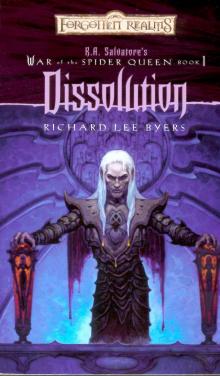 Dissolution
Dissolution Arkham Horror- Ire of the Void
Arkham Horror- Ire of the Void The Haunted Lands: Book II - Undead
The Haunted Lands: Book II - Undead The Shattered Mask
The Shattered Mask Dark Kingdoms
Dark Kingdoms The Masked Witches: Brotherhood of the Griffon, Book IV
The Masked Witches: Brotherhood of the Griffon, Book IV The Plague Knight and Other Stories
The Plague Knight and Other Stories Unclean: The Haunted Lands
Unclean: The Haunted Lands The Captive Flame: Brotherhood of the Griffon • Book 1
The Captive Flame: Brotherhood of the Griffon • Book 1 The Taste of Waterfruit and Other Stories (Story Portals)
The Taste of Waterfruit and Other Stories (Story Portals) The masked witches botg-4
The masked witches botg-4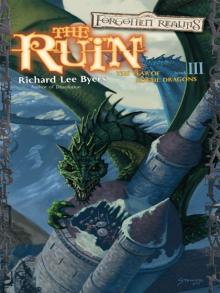 The Ruin
The Ruin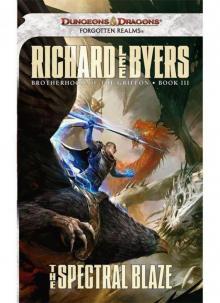 The Spectral Blaze botg-3
The Spectral Blaze botg-3 The Masked Witches
The Masked Witches Blind God's bluff bf-1
Blind God's bluff bf-1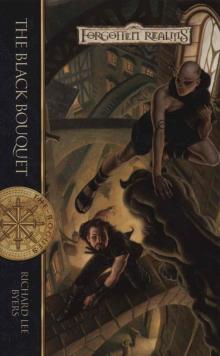 The Black Bouquet r-2
The Black Bouquet r-2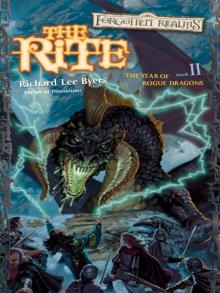 The Rite
The Rite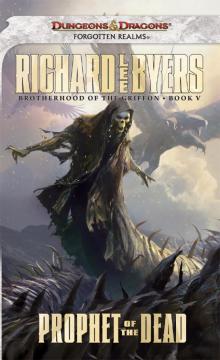 Prophet of the Dead: Forgotten Realms
Prophet of the Dead: Forgotten Realms The Shattered Mask s-3
The Shattered Mask s-3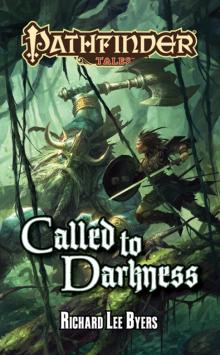 Called to Darkness
Called to Darkness Undead hl-2
Undead hl-2 Blind God's Bluff: A Billy Fox Novel
Blind God's Bluff: A Billy Fox Novel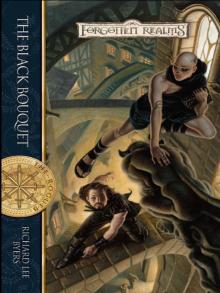 The Black Bouquet
The Black Bouquet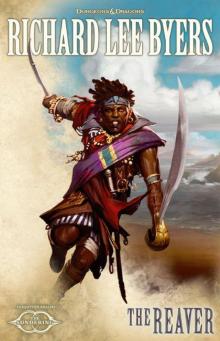 The Reaver
The Reaver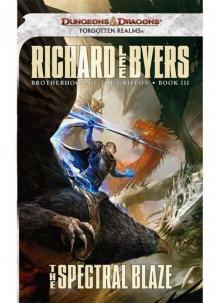 The Spectral Blaze: A Forgotten Realms Novel
The Spectral Blaze: A Forgotten Realms Novel Queen of the Depths
Queen of the Depths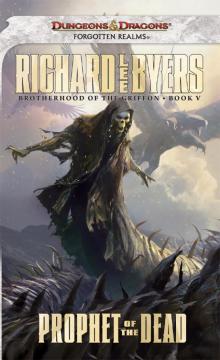 Prophet of the Dead botg-5
Prophet of the Dead botg-5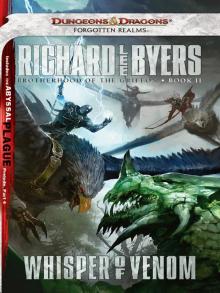 Whisper of Venom: Brotherhood of the Griffon, Book II
Whisper of Venom: Brotherhood of the Griffon, Book II The Captive Flame botg-1
The Captive Flame botg-1 The Haunted Lands: Book III - Unholy
The Haunted Lands: Book III - Unholy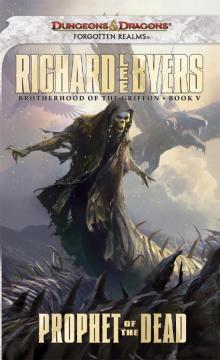 Prophet of the Dead
Prophet of the Dead The Colors of Magic Anthology (magic: the gathering)
The Colors of Magic Anthology (magic: the gathering) Unholy hl-3
Unholy hl-3 Unclean hl-1
Unclean hl-1 Blind God's Bluff
Blind God's Bluff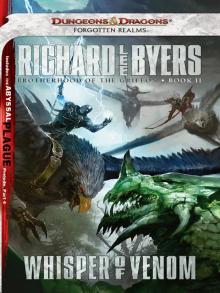 Whisper of Venom botg-2
Whisper of Venom botg-2 The Spectral Blaze
The Spectral Blaze